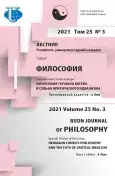Is Hermann Cohen a Classical Philosopher?
- Autores: Poma A., Belov V.N.1
-
Afiliações:
- RUDN University
- Edição: Volume 25, Nº 3 (2021): HERMANN COHEN'S PHILOSOPHY AND THE FATE OF CRITICAL IDEALISM
- Páginas: 371-377
- Seção: HERMANN COHEN'S PHILOSOPHY AND THE FATE OF CRITICAL IDEALISM
- URL: https://journal-vniispk.ru/2313-2302/article/view/325007
- DOI: https://doi.org/10.22363/2313-2302-2021-25-3-371-377
- ID: 325007
Citar
Texto integral
Resumo
The article attempts to raise a question and give an answer to it regarding the evaluation of the philosophical creativity of Hermann Cohen, the German-Jewish thinker of the late XIX - early XX century. Moreover, following the philosophical style of Cohen himself, the question posed and discussed in the article is not idle, but it contains a hypothesis that forms our answer in a certain way. It is important to identify the difficulties and intellectual determinants that prevent the formation of a clear and unambiguous answer. At the same time these difficulties contain an initiating moment for opening a philosophical debate. The historical and philosophical reasons that make the very beginning of the discussion of the question more complex, are considered. The article, of course, cannot claim to be an exhaustive answer on such a fundamental topic, which is contained in the designated question. But the article itself, and the articles following it in the section devoted to the work of Herman Cohen, may be indicate that the time for this discussion has come.
Sobre autores
Andrea Poma
Autor responsável pela correspondência
Email: andrea.poma@unito.it
PhD, Professor
10, Corso Mortara, Turin, 10149, ItalyVladimir Belov
RUDN University
Email: belov-vn@rudn.ru
Doctor of Philosophy, Professor, Chair of Ontology and Epistemology
6, Miklukho-Maklaya Str., Moscow, 117198, Russian FederationBibliografia
- Adelmann D. Reinige dein Denken. Über den jüdischen Hintergrund der Philosophie von Hermann Cohen. Würzburg: Königshausen & Neumann, 2010.
- Belov VN. Hermann Cohen in the History of Russian Neo-Kantianism. Russian Studies in Philosophy. 2016;(54):395-407.
- Belov VN. Hermann Cohen's System of Critical Idealism. Voprosy Filosofii. 2006;4:144-150.
- Belov VN. Is Hermann Cohen Neo-Kantian? Kantian Journal. 2015;3(53):38-46. doi: 10.5922/0207-6918-2015-3-3.
- Edel G. Von der Vernunftkritik zur Erkenntnislogik. Die Entwicklung der theoretischen Philosophie Hermann Cohens. Freiburg/München: Edition Gorz; 1988.
- Gamba E. The Problem of Individuality in Hermann Cohen's Aesthetics. RUDN Journal of Philosophy. 2019;23(4):413-419. doi: 10.22363/2313-2302-2019-23-4-413-419.
- Marx von W, Orth EW, editors. Hermann Cohen und die Erkenntnistheorie. Würzburg: Königshausen & Neumann; 2001.
- Munk RW, editor. Hermann Cohen's Critical Idealism. Dordrecht: Springer; 2005.
- Sokuler ZA. German Kogen i filosofiya dialoga [Hermann Cohen and Philosophy of Dialogue]. Мoscow: Progress-Traditsiya Publ.; 2008. (In Russian).
- Wiedebach H. Die Hermann-Cohen-Bibliothek. In: Cohen H. Werke. Supplementa. Band 2. Hildesheim: Georg Olms Verlag; 2000.
- Munk R. Der andere kritische Idealismus von Hermann Cohen. In: Deutsche Zeitschrift für Philosophie. 2011; 59(2):271-282.
- Poma A. Cadenzas. Philosophical Notes for Postmodernism. Cham: Springer, 2017.
- Brandt R, Sturm Th. Klassische Werke der Philosophie. Von Aristoteles bis Habermas. Leipzig: Reclam; 2002.
- Nipperdey Th. Deutsche Geschichte 1866-1918. Bd. 1. München: C.H. Beck; 1990.
- Adelmann D. Einheit des Bewußtseins als Grundproblem der Philosophie Hermann Cohen [PhD Dissertation]. Heidelberg: University of Heidelberg; 1968.
- Holzhey H. Cohen und Natorp. Bd. 1: Ursprung und Einheit. Die Geschichte der “Marburger Schule” als Auseinandersetzung um die Logik des Denkens. Bd. 2: Der Marburger Neukantianismus in Quellen. Basel-Stuttgart: Schwabe & Co; 1986.
Arquivos suplementares









